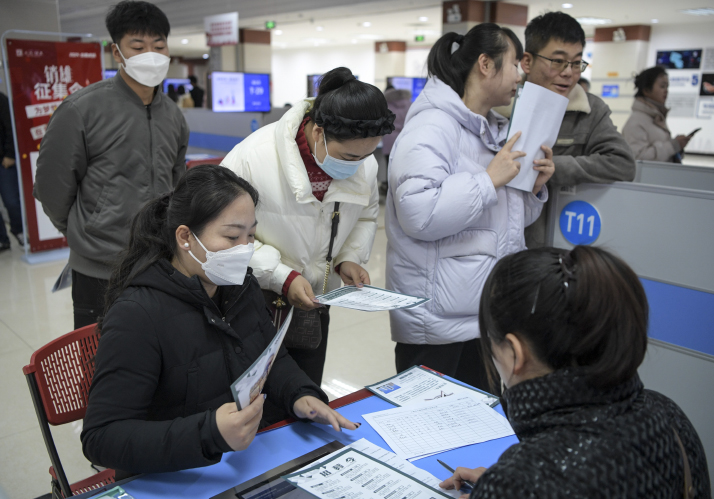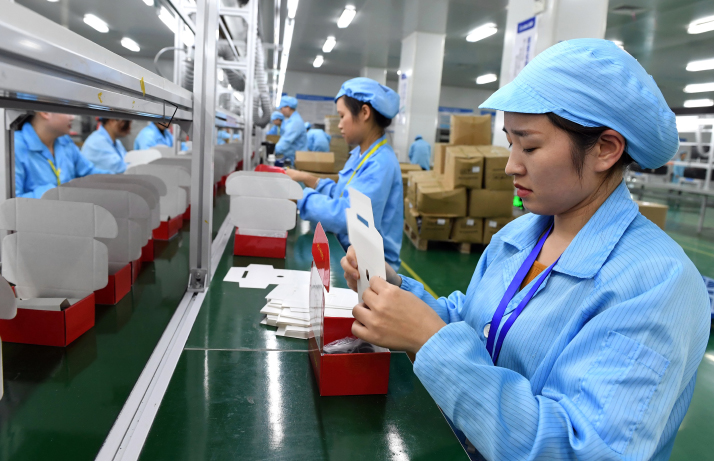| China |
| Helping mothers juggle work and family | |
|
|
 A job seeker talks with a potential employer at a job fair aimed at boosting the employment of women, in Yinchuan, Ningxia Hui Autonomous Region, on March 2 (XINHUA)
Liu Chang, a Beijing resident who had been a stay-at-home mother for six years, decided to return to work earlier this year. However, finding a job was not easy. She visited three job fairs, but the positions that interested her either required shift work or had an age limit of 35. Unlike traditional job seekers who put more emphasis on salary and benefits, flexible working hours topped the list when Liu began her job search. "I need a job that allows me to drop my son off at school in the morning and pick him up in the afternoon, and I want to spend time with him on the weekends," Liu told China Youth Daily. Finally on March 8, Liu visited a Women's Day job fair organized by Shijingshan District Human Resources and Social Security Bureau (HRSSB). In contrast to the job fairs Liu had attended earlier this year, the job fair offered "mothers' posts," meaning positions that allow flexible working hours and enable mothers to balance family and work. At the job fair, Liu found a job at a kindergarten that is 10 minutes' bike ride from her home. The kindergarten allows flexible working hours, and she only needs to work four hours a day, enabling her to work and take care of her son at the same time. Ma Jinying, deputy head of the employment service department at Shijingshan District HRSSB, began paying attention to the employment needs of stay-at-home mothers last year, when one mother asked whether mothers' posts could be offered at job fairs. At that time, Ma had little understanding of the concept. She began learning about mothers' posts and found out that cities in south China, especially in Guangdong Province, had already experimented with them. Last April, the Human Resources and Social Security Department of Guangdong issued a draft guideline on promoting mothers' posts to boost the employment of women. According to the guideline, mothers' posts are posts provided to working-age women with children under 12 years old. They offer flexible working hours to enable mothers to balance work and child rearing. The document said labor contracts for mothers' posts should include stipulations that employees enjoy flexible working hours, employers shouldn't force them to work overtime and they can ask for leave when they need to take care of their children. Inspired by the practices in other regions, Ma identified 10 companies with the capacity to offer flexible employment and encourage them do so at the Women's Day job fair. These posts include sales, customer service and cashier roles, with monthly salaries up to 10,000 yuan ($1,382). Li Lei, head of the kindergarten where Liu now works, told China Youth Daily that his kindergarten now provides 11 mothers' posts. "Being patient with and caring for children is a prerequisite for a kindergarten teacher. I think mothers are very suitable kindergarten teachers from this perspective," Li said.  Women work on a mobile phone production line at a company in Liancheng County, Fujian Province, on November 6, 2020. From September to November that year, the county introduced more than 100 positions with flexible working hours to help local mothers balance work and family (XINHUA)
Pros and cons The Women's Studies Institute of the All-China Women's Federation conducted a survey on the status of full-time mothers under 40 years old in Beijing and Shanghai municipalities and Guangzhou and Shenzhen in Guangdong from September to November last year. The survey showed that 82.7 percent of these mothers have plans to become reemployed, with 38.4 percent hoping to land full-time employment and 44.3 percent hoping to find part-time jobs or flexible employment. However, as these mothers have been absent from the job market for a long time and owing to the discrimination in the market against those over 35 years old, they have few opportunities to find employment. "Mothers' posts have eased stay-at-home mothers' anxiety about finding jobs," Liu said. "Mothers' posts not only reduce financial pressures on families but also contribute to the building of a birth-friendly society," read a commentary published on Rednet.cn on March 29. China has relaxed its family planning policy, introduced in the late 1970s, multiple times in recent years, allowing all couples to have two children from 2015 onward. On July 20, 2021, the Communist Party of China Central Committee and the State Council, the highest state administrative organ, passed a decision on improving birth policies to promote long-term and balanced population development, which increased the number of children allowed to three per couple. It's also notable that the development of the digital economy in recent years has provided more opportunities for women to find flexible employment. According to a report on women's employment on digital platforms in China in 2022, released by Yuhang District Women's Federation in Hangzhou, Zhejiang Province, along with Beijing-based think tank Equal-Ocean and Hangzhou-based Jingling Technology Co. Ltd., more than 38 million women in China were employed through digital platforms in 2022. Nearly 60 percent of livestream hosts and 10 percent of drivers on leading ride-hailing apps were women. The report said the digital economy has reduced women's disadvantage in the job market as it has given rise to many new jobs with flexible working hours. Women are finding more opportunities to work in telemedicine, online education and livestream e-commerce. In addition to these upsides, there are also challenges arising from the promotion of mothers' posts. For instance, some are concerned that the promotion of these positions might entrench traditional gender role norms, which consider childrearing a woman's responsibility. In addition, the existing mothers' posts often lack paths for promotion and do not suit high-caliber professional women. Employers also have qualms about offering these posts for fear of increased labor costs. The practice in Zhongshan City of Guangdong might represent a solution for alleviating employers' concerns and encouraging them to offer more mothers' posts. In July 2022, Zhongshan introduced several measures to promote mothers' posts in the city, which include providing 400 yuan ($55) in subsidies per month to companies for every mothers' post they offer. The city also provides 300 yuan ($41) in social insurance subsidies per month for every person employed in these posts. In addition, employers can also enjoy tax benefits in the first three years they offer the positions. Li said more policy and financial support from the government will reduce the burden on enterprises and increase their willingness to offer more mothers' posts. BR (Print Edition Title: The Right Balance) Copyedited by G.P. Wilson Comments to jijing@cicgamericas.com |
|
||||||||||||||||||||||||||||||
|
